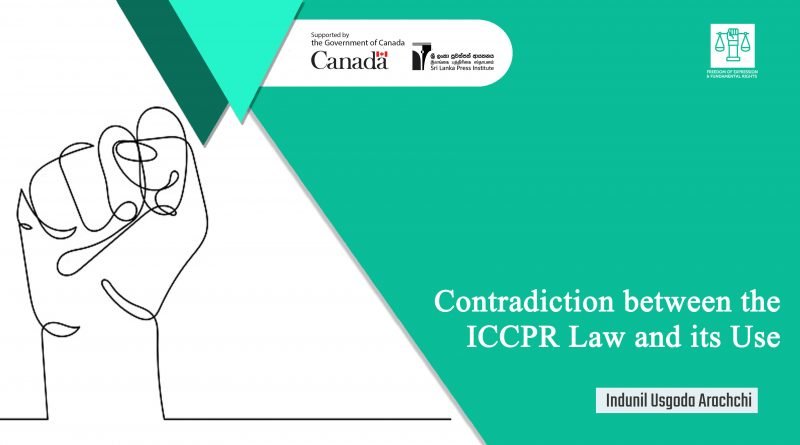
Contradiction between the ICCPR Law and its Use
Indunil Usgoda Arachchi
The writer, Shakthika Sathkumara was arrested by the Polgahawela Police on April 1st, 2019 due to him publishing a short story called ‘Ardha’ on his Facebook page. The police report to the court claimed that based on the provisions of Article 3(1) of the International Covenant on Civil and Political Rights (ICCPR) Act No. 56 of 2007, his story incites religious hatred and that any attempt to incite anti-religious sentiments and insult religious sentiments are banned under section 291b of the Penal Code. Shakthika, who is incidentally a recipient of various literary awards, was remanded in custody for 130 days for posting his work and was released on bail on August 08, 2019. Finally, Sathkumara was acquitted after the Attorney General informed the Polgahawela Magistrate’s Court that there was no cause for action on February 9th, 2021.
Another similar arrest was reported on April 3 last year. Ramzi Razik was arrested by the police under the ICCPR Act for being a social activist as well as for speaking out against extremism and racism on social media. The arrest was based on his Facebook post dated April 3rd, 2020 and he will only be released on bail after September 17th, 2020. The point of such arrests was that a bill to protect human rights was abused, restricted freedom of speech and used to enforce repression.
Another arrest under the ICCPR act was Abdul Rahim Masahina, who wore a dress with the image of a rudder on a ship, but was arrested and remanded under the false claim that her dress contained the image of a Dharma Chakra instead. The Hasalaka police arrested another woman named Fatima Nushra Sarook and remanded her on the claim that the image of the Dharma Chakra was also found in her dress. Naomi Coleman, a British woman, was arrested by police at the Katunayake International Airport in 2014 for allegedly tattooing a Buddha image in the middle of a lotus flower on her arm. She was later deported from Sri Lanka by a magistrate’s court, but the Supreme Court of Sri Lanka ordered her to pay Rs. 800,000 in damages and legal fees at the end of her human rights case. The British woman, who had visited Sri Lanka several times before, had said that she was a devout Buddhist and had tattooed a Buddha on her arm out of respect for the Buddha.
The whole purpose of the UN Convention on International Civil and Political Rights enacted in Sri was preventing ethnic and religious hatred, war or discrimination. The International Covenant on Civil and Political Rights (ICCPR) has been in force in Sri Lanka since 2007. Its purpose is to uphold certain human rights not enshrined in the Constitution. The preamble to the Act states that “an Act is intended to provide for the enforcement of certain statutes relating to human rights which are not recognized by the constitutional measures of the International Covenant on Civil and Political Rights, and for matters connected therewith or incidental thereto.” The High Court is the first court to grant bail under Section 3(1) of the Act to a person arrested for an offense under this Act. That is, the person cannot obtain bail from a lower court than the High Court. Accordingly, the Bail Act No. 30 of 1997 also does not apply to such an arrest.
In spite of such a situation, it is clear from the above incidents that the manner in which this Act has been implemented with regard to certain arrests during the war as well as in recent times, is not good in the country. It is clear that the ICCPR Act, which was introduced to protect human rights, has been used in cases that attempt to restrict civil liberties such as the freedom of speech and to repress the masses. There are instances where it has at times become a law of repression that works for different political purposes as well as the interests of different individuals and religious leaders.
Celebrating Shakthika’s release should not be cause to forget all such incidents. It is important to create a massive discourse on the abuses of the ICCPR Act based on the ruling on energy. This incident should pave the way for an incentive to stop the various repressions and violations of fundamental rights that take place under the guise of the Act.








